
 |
home ao english musik literatur journalismus bilder sprachen mehr shop sitemap | |
Auf der Schatzinsel 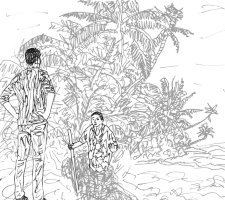 |
On Treasure Island  |
Sur l'Île au Trésor  |
Sull'Isola del Tesoro  |
En la Isla del Tesoro  |
(Deutsch) Heinz und Helmut sind „Die Jungs”. In der Fünf-Minuten-Dialogserie geraten die beiden in die unwahrscheinlichsten Situationen. |
(English) Heinz and Helmut are "The Boys". In the five-minute dialogue series, the two get into the most unlikely situations. |
(Français) Heinz et Helmut sont « Les Gars ». Dans la série de dialogues de cinq minutes, les deux se retrouvent dans les situations les plus improbables. |
(Italiano) Heinz e Helmut sono "I Ragazzi". Nella serie dialogata di episodi di cinque minuti, i due si trovano nelle situazioni più improbabili. |
(Español) Heinz y Helmut son "Los Chicos". En esta serie de diálogos de cinco minutos, los dos se encuentran en las situaciones más inverosímiles. |
Die Jungs auf der Schatzinsel (2024): Eine Schatzkarte ist in den Besitz von Helmut gelangt, der sich hoch verschuldet hat und Heinz bittet, mit ihm den Schatz zu heben. |
The Boys on Treasure Island (2024): A treasure map has come into the possession of Helmut, who is heavily in debt and asks Heinz to help him unearth the treasure. |
Les Gars sur l'Île au Trésor (2024) : Une carte au trésor est entrée en possession d'Helmut, qui s'est lourdement endetté et demande à Heinz de l'aider à déterrer le trésor. |
I Ragazzi sull'Isola del Tesoro (2024): Una mappa del tesoro è entrata in possesso di Helmut, che è fortemente indebitato e chiede a Heinz di dissotterrare il tesoro con lui. |
Los Chicos en la Isla del Tesoro (2024): Un mapa del tesoro llega a manos de Helmut, que está muy endeudado y pide a Heinz que le ayude a desenterrar el tesoro. |
(English) Peace has returned to the Boys again: Heinz reaches new heights with Fiona and has found a meaningful occupation, while Helmut enjoys life with Hedu's father. But what is this project Helmut is talking about? |
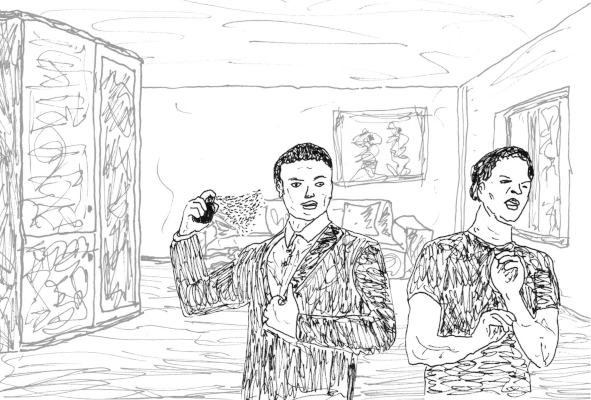 |
(Italiano) Tra i Ragazzi è tornata la pace: Heinz ha raggiunto dei nuovi livelli con Fiona e ha trovato un'occupazione significativa, mentre Helmut si sta godendo la vita con il padre di Hedu. Ma qual è il progetto di cui parla Helmut? |
(Deutsch) Es ist wieder Ruhe eingekehrt bei den Jungs: Heinz erreicht mit Fiona neue Höhen und hat eine sinnvolle Beschäftigung gefunden, während Helmut mit Hedus Vater das Leben genießt. Aber was ist das für ein Projekt, von dem Helmut erzählt? Special Version | ||
Tag 1 Heinz: Sag mal, wolltest du nicht das Badezimmer machen? |
Day 1 Heinz: Say, didn't you want to clean the bathroom? |
Jour 1 Heinz : Dis, tu ne voulais pas nettoyer la salle de bain ? |
Giorno 1 Heinz: Senti, non volevi pulire il bagno? |
Día 1 Heinz: Dime, ¿no querías limpiar el baño? |
(English) When Helmut takes Heinz down to the cellar to share what's troubling him, it must be really important. Anyway, the day doesn't start well for either of them and one wonders who is hit worse. |
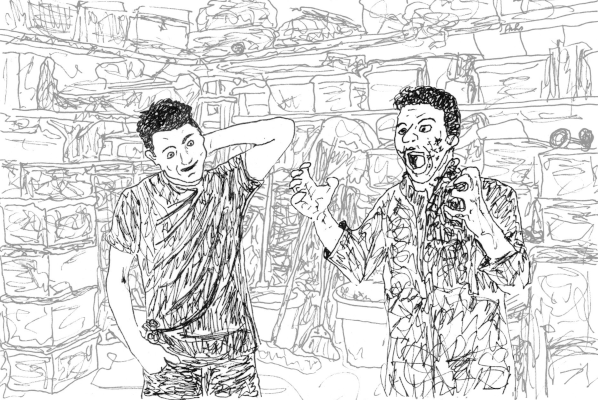 |
(Italiano) Se Helmut porta Heinz in cantina per dirgli cosa gli passa per la testa, deve essere davvero importante. In ogni caso, la giornata non inizia bene per nessuno dei due e ci si chiede chi stia peggio. |
(Deutsch) Wenn Helmut Heinz bis in den Keller mitnimmt, um ihm zu sagen, was er auf dem Herzen hat, muss es wirklich wichtig sein. Der Tag fängt jedenfalls für beide nicht gut an und man fragt sich, wen es schlimmer trifft. Special Version | ||
Tag 2 Heinz: Morgen! Wann bist du denn gekommen? Gähn |
Day 2 Heinz: Morning! When did you get back? Yawn |
Jour 2 Heinz : Bonjour ! Quand es-tu rentré ? Baille |
Giorno 2 Heinz: Buongiorno! Quando sei tornato? Yawn |
Día 2 Heinz: ¡Buenos días! ¿Cuándo has llegado? Bostezo |
(English) Helmut has not grasped the implications of his behavior, so Heinz takes him to a place where he can make some progress. Whether this helps, however, remains questionable at first. |
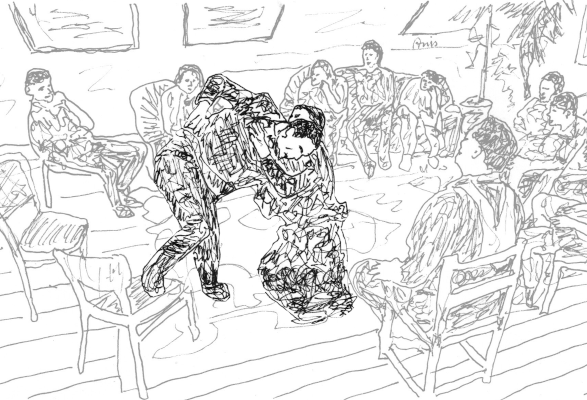 |
(Italiano) Helmut non ha capito le conseguenze del suo comportamento, quindi Heinz lo porta in un luogo dove può fare dei progressi. All'inizio, però, non è certo che questo possa essere d'aiuto. |
(Deutsch) Helmut hat die Tragweite seines Verhaltens nicht begriffen, daher bringt Heinz ihn an einen Ort, wo er einen Schritt weiterkommt. Ob das allerdings hilft, bleibt zunächst fraglich. Special Version | ||
Tag 2 Heinz: Ich glaube, hier müssen wir aussteigen. Nee, die nächste. |
Day 2 Heinz: I think we have to get off here. Nah, the next one. |
Jour 2 Heinz : Je crois que c'est là que nous devons descendre. Nan, la prochaine. |
Giorno 2 Heinz: Penso che dobbiamo scendere qui. No, la prossima. |
Día 2 Heinz: Creo que tenemos que bajar aquí. No, el siguiente. |
(English) Heinz finds a way to persuade Helmut to make a binding agreement that takes him away from his problem. A little unconventional perhaps, but there are situations in which a decision is necessary. So when they arrive home, Helmut is in for a surprise. |
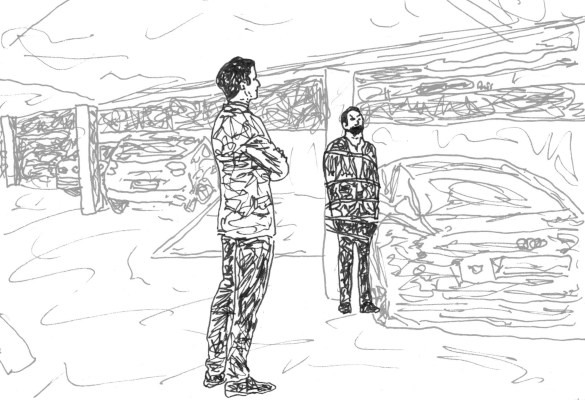 |
(Italiano) Heinz trova un modo per convincere Helmut a fare un accordo vincolante che lo allontana dal suo problema. Forse è un po' anticonvenzionale, ma ci sono situazioni in cui è necessario prendere una decisione. Così, all'arrivo a casa, Helmut si trova di fronte a una sorpresa. |
(Deutsch) Heinz findet ein Mittel, um Helmut zu einer bindenden Vereinbarung zu bewegen, die ihn von seinem Problem wegbringt. Ein wenig unkonventionell vielleicht, aber es gibt Situationen, in denen eine Entscheidung nötig ist. Zu Hause angekommen erwartet Helmut daher eine Überraschung. Special Version | ||
Tag 2 Helmut: Pass auf: Ich knack erst mal ne Runde und morgen überlegen wir in Ruhe, was wir machen. Ist das ein Angebot? |
Day 2 Helmut: Listen: I'll get a good night's sleep and tomorrow we'll think about how to proceed. Is that an offer? |
Jour 2 Helmut : Écoute : Je vais roupiller un peu et demain nous réfléchirons tranquillement à ce que nous allons faire. C'est une offre ? |
Giorno 2 Helmut: Ascolta: Mi farò una bella dormita e domani penseremo a come procedere. È un'offerta? |
Día 2 Helmut: Escucha: voy a dormir un poco y mañana pensaremos qué vamos a hacer. ¿Es una oferta? |
(English) The Boys' mood is sombre. Helmut stares meditatively into the rain and Heinz is at a loss. A phone call brings them both out of their stupor. Heinz learns something about the owner of the second half of the treasure map and about a detail he had overlooked. |
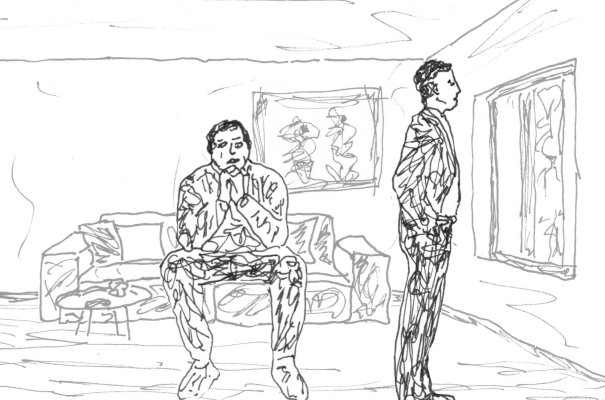 |
(Italiano) L'umore dei Ragazzi è cupo. Helmut fissa meditabondo la pioggia e Heinz non sa cosa fare. Una telefonata fa uscire entrambi dal loro torpore. Heinz scopre qualcosa sul proprietario della seconda metà della mappa del tesoro e su un dettaglio che aveva trascurato. |
(Deutsch) Die Stimmung bei den Jungs ist getrübt. Helmut starrt meditativ in den Regen und Heinz ist ratlos. Ein Anruf holt die beiden aus ihrer Starre. Heinz erfährt etwas über den Besitzer der zweiten Hälfte der Schatzkarte und über ein Detail, das er übersehen hatte. Special Version | ||
Tag 3 Heinz: Glaubst du nicht, es reicht jetzt? |
Day 3 Heinz: Don't you think that's enough now? |
Jour 3 Heinz : Tu ne penses pas que ça suffit maintenant ? |
Giorno 3 Heinz: Non pensi che sia sufficiente ora? |
Día 3 Heinz: ¿No crees que basta ya? |
(English) At a meeting in Wiesbaden, Heinz can get a first impression of their new business partner and finds himself in doubt. But this has to wait, because first he has to make his way back to the station, which is not without obstacles. |
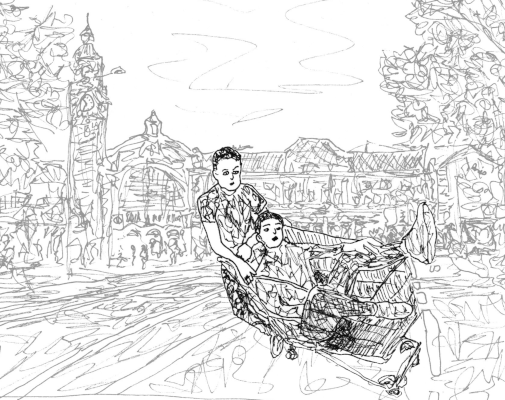 |
(Italiano) Durante un incontro a Wiesbaden, Heinz riesce a farsi una prima idea del nuovo partner commerciale e ha dei dubbi. Ma deve rimandarli, perché prima deve riuscire a tornare alla stazione ferroviaria, che si rivela un percorso non privo di ostacoli. |
(Deutsch) Bei einem Treffen in Wiesbaden kann sich Heinz ein erstes Bild von ihrem neuen Geschäftspartner machen und er hat Zweifel. Die aber muss er verschieben, denn zunächst gilt es, den Rückweg zum Bahnhof zu bewältigen, was durchaus mit Hindernissen verbunden ist. Special Version | ||
Tag 4 Helmut: Geht's? |
Day 4 Helmut: You okay? |
Jour 4 Helmut : Ça va ? |
Giorno 4 Helmut: Stai bene? |
Día 4 Helmut: ¿Estás bien? |
(English) Tech wizard Max's software brings to light what had been hidden for centuries. When Heinz sees the result, he is anything but convinced. But since he has already said A, he has to say B too, thinks Helmut. |
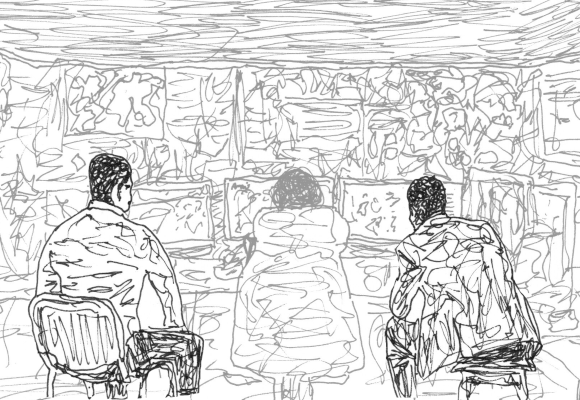 |
(Italiano) Il software del mago della tecnologia Max rivela ciò che è stato nascosto per secoli. Quando Heinz vede il risultato, è tutt'altro che convinto. Ma dato che ha già detto A, deve dire B, pensa Helmut. |
(Deutsch) Die Software des Technikzauberers Max bringt zutage, was jahrhundertelang verborgen gewesen war. Als Heinz das Ergebnis sieht, ist er alles andere als überzeugt. Da er aber schon A gesagt hat, muss er auch B sagen, denkt Helmut. Special Version | ||
Tag 5 Heinz: Hallo Max! Nun lernen wir uns endlich mal kennen. Oh, Katze. |
Day 5 Heinz: Hello Max! Now we finally get to meet. Oh, cat. |
Jour 5 Heinz : Salut Max ! On fait enfin connaissance. Oh, un chat. |
Giorno 5 Heinz: Ciao Max! Ora finalmente ci conosciamo. Oh, gatto. |
Día 5 Heinz: ¡Hola Max! Por fin nos conocemos. Oh, gato. |
(English) Fiona is happy: she has a good man, money, a wonderful loaf of bread and she's going on vacation soon. No wonder she's celebrating with her best friend at a picnic by the water. It's a beautiful day, really, except for one small thing... |
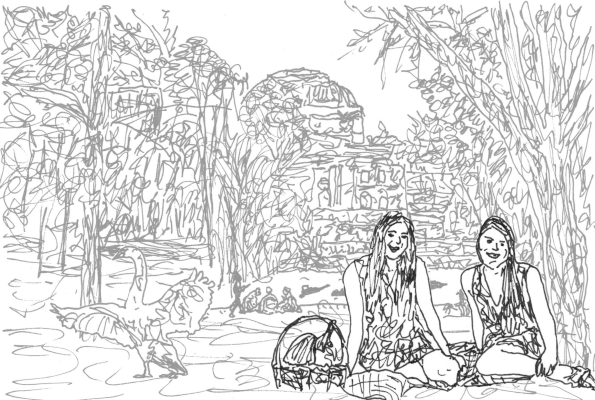 |
(Italiano) Fiona è felice: ha un buon uomo, soldi, una splendida pagnotta e presto andrà in vacanza. Non c'è da stupirsi che stia festeggiando con la sua migliore amica in un picnic in riva al mare. È davvero una bella giornata, tranne che per una piccola cosa... |
(Deutsch) Fiona ist glücklich: Sie hat einen guten Mann, Geld, ein wunderbares Brot und schon bald fährt sie in den Urlaub. Kein Wunder, dass sie das mit ihrer besten Freundin bei einem Picknick am Wasser feiert. Es ist ein schöner Tag, wirklich, bis auf eine Kleinigkeit ... Special Version | ||
Tag 7 Fanni: Da neben dem Baum ist eine schöne Stelle. Was meinst du? |
Day 7 Fanni: There's a nice spot next to the tree. What do you think? |
Jour 7 Fanni : Il y a un bel endroit à côté de l'arbre. Qu'est-ce que tu en penses ? |
Giorno 7 Fanni: C'è un bel posto vicino all'albero. Che ne pensi? |
Día 7 Fanni: Hay un buen sitio junto al árbol. ¿Qué te parece? |
(English) Heinz, Fiona and Helmut rent a holiday home on the scenic coast of Portugal, in Nazaré, north of Lisbon, because Gustavo's family is supposed to live there. But before they find them, Heinz and Fiona already come into contact with them in a most unusual way. |
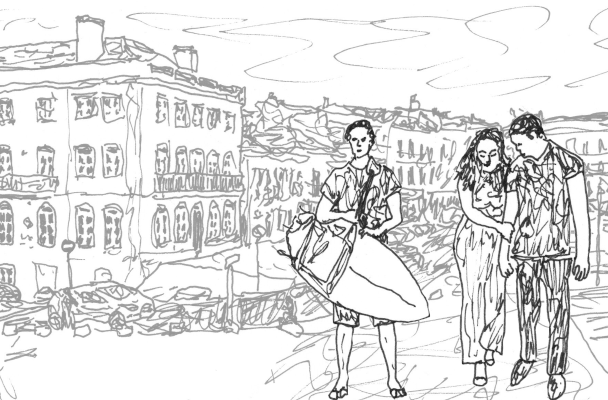 |
(Italiano) Heinz, Fiona e Helmut affittano una casa per le vacanze sulla splendida costa del Portogallo, a Nazaré, a nord di Lisbona, perché è qui che dovrebbe vivere la famiglia di Gustavo. Ma prima ancora di trovarli, Heinz e Fiona entrano in contatto con loro in un modo del tutto insolito. |
(Deutsch) An der malerischen Küste Portugals, in Nazaré nördlich von Lissabon, mieten sich Heinz, Fiona und Helmut ein Ferienhaus, denn an diesem Ort soll Gustavos Familie leben. Doch noch bevor sie sie finden, treten Heinz und Fiona bereits mit ihr in Kontakt, und das auf eine höchst ungewöhnliche Weise. Special Version | ||
Tag 12 Heinz: Willst du jetzt die ganze Zeit mit diesem Teil durch die Gegend laufen? |
Day 12 Heinz: Do you want to walk around with that thing the whole time now? |
Jour 12 Heinz : Tu veux te promener avec ce truc tout le temps maintenant ? |
Giorno 12 Heinz: Hai intenzione di andare in giro con questa cosa per tutto il tempo allora? |
Día 12 Heinz: ¿Ahora quieres andar todo el rato con esa cosa? |
(English) With the help of his extraordinary abilities, Helmut tracks down the sought Gustavo faster than Heinz could have imagined. It gradually dawns on Helmut that he has entered completely new territory on his high-flying streak. |
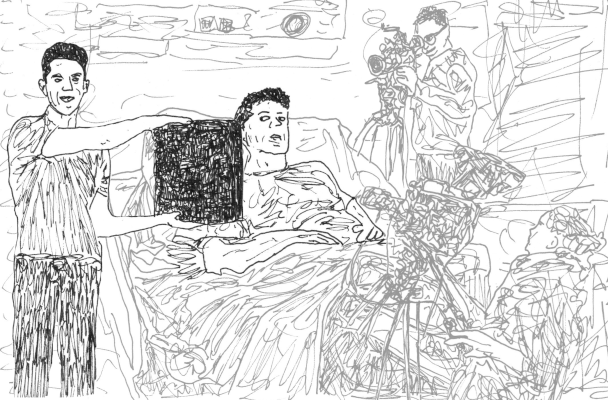 |
(Italiano) Con l'aiuto delle sue straordinarie capacità, Helmut rintraccia Gustavo più velocemente di quanto Heinz potesse immaginare. Durante il suo slancio trionfante, Helmut raggiunge un territorio completamente nuovo, come si rende gradualmente conto. |
(Deutsch) Mithilfe seiner außergewöhnlichen Fähigkeiten stöbert Helmut den gesuchten Gustavo schneller auf, als Heinz es sich hätte vorstellen können. Auf seinem Höhenflug erreicht Helmut völlig neues Terrain, wie ihm nach und nach klar wird. Special Version | ||
Tag 12 Heinz: Du hast es also wieder mal geschafft! Mann, Mann, Mann! |
Day 12 Heinz: So you've done it again! Man, man, man! |
Jour 12 Heinz : Tu as donc réussi une fois de plus ! Mec, mec, mec ! |
Giorno 12 Heinz: Allora l'hai fatto di nuovo! Amico, amico, amico! |
Día 12 Heinz: ¡Así que lo has vuelto a hacer! ¡Tío, tío, tío! |
(English) The Boys visit Gustavo at his house in Nazaré. Heinz takes the opportunity of the walk to ask Helmut about his peculiar ring. Helmut reacts grumpily, but then he talks freely about the things Heinz wants to know. |
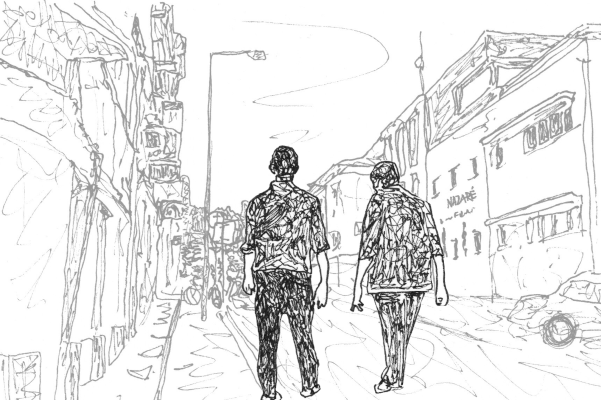 |
(Italiano) I Ragazzi fanno visita a Gustavo nella sua casa di Nazaré. Heinz approfitta della passeggiata per chiedere a Helmut del suo straordinario anello. Helmut reagisce in modo scontroso, ma poi parla apertamente delle cose che Heinz vuole sapere. |
(Deutsch) Die Jungs besuchen Gustavo in seinem Haus in Nazaré. Heinz nutzt die Gelegenheit des Fußmarschs, um Helmut nach seinem sonderbaren Ring zu fragen. Helmut reagiert missmutig, aber dann erzählt er freimütig über die Dinge, die Heinz wissen will. Special Version | ||
Tag 13 Helmut: Wie hast du Gustavo überhaupt erkannt, gestern am Strand? |
Day 13 Helmut: So how did you even recognize Gustavo yesterday on the beach? |
Jour 13 Helmut : Au fait, comment as-tu reconnu Gustavo, hier sur la plage ? |
Giorno 13 Helmut: A proposito, come hai riconosciuto Gustavo sulla spiaggia ieri? |
Día 13 Helmut: Por cierto, ¿cómo reconociste a Gustavo, ayer en la playa? |
(English) When Gustavo reads the Captain Castanheira's diaries to the Boys, Heinz eagerly takes notes, while Helmut trusts in his own approach and insists that it makes sense. He finally demonstrates it to the other two, leaving them baffled. |
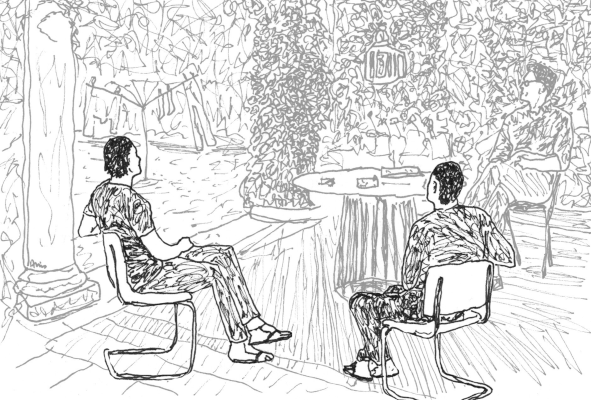 |
(Italiano) Quando Gustavo legge ai Ragazzi i diari del capitano Castanheira, Heinz prende appunti con entusiasmo, mentre Helmut si fida del proprio approccio e insiste sulla sua validità. Alla fine lo dimostra agli altri due, lasciandoli a bocca aperta. |
(Deutsch) Als Gustavo den Jungs die Tagebücher des Käpten Castanheira vorliest, macht sich Heinz eifrig Notizen, während Helmut auf seine eigene Herangehensweise vertraut und darauf besteht, dass sie Hand und Fuß hat. Er demonstriert sie den beiden anderen schließlich, was sie verblüfft zurücklässt. Special Version | ||
Tag 13 Helmut: So, ich denke, nun haben wir alles, was wir brauchen. Lass uns abhauen! |
Day 13 Helmut: Well, I think we have everything we need now. Let's get out of here! |
Jour 13 Helmut : Bon, je crois qu'on a tout ce qu'il faut maintenant. Tirons-nous d'ici ! |
Giorno 13 Helmut: Allora, credo che ora abbiamo tutto quello che ci serve. Andiamo via di qui! |
Día 13 Helmut: Bueno, creo que ya tenemos todo lo que necesitamos. Vámonos de aquí. |
(English) The week in Portugal is drawing to a close. Heinz and Helmut are sitting on the beach, summing up the situation, when an old acquaintance appears. He gives Heinz another tip and otherwise attracts attention with his equally quick-witted and bizarre behavior. Fiona is horrified. |
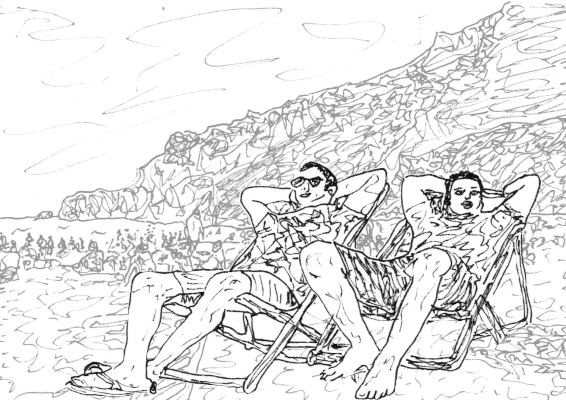 |
(Italiano) La settimana in Portogallo sta per finire. Heinz e Helmut sono seduti sulla spiaggia e stanno riassumendo lo stato delle cose quando appare una vecchia conoscenza. Dà un'altra mancia a Heinz e si fa notare per il suo comportamento, tanto perspicace quanto bizzarro. Fiona è inorridita. |
(Deutsch) Die Woche in Portugal nähert sich dem Ende. Heinz und Helmut sitzen am Strand und resümieren den Stand der Dinge, als ein alter Bekannter erscheint. Der gibt Heinz einen weiteren Tipp und fällt ansonsten durch sein ebenso geistesgegenwärtiges wie bizarres Verhalten auf. Fiona ist entsetzt. Special Version | ||
Tag 18 Heinz: Du, Helmut? |
Day 18 Heinz: Say, Helmut? |
Jour 18 Heinz : Dis, Helmut ? |
Giorno 18 Heinz: Dimmi, Helmut? |
Día 18 Heinz: Dime, ¿Helmut? |
(English) Back in Germany, the Boys are in for a nasty surprise and have to change their plans. Heinz takes the matter in stride, while Helmut can only be calmed down by an ice cream, to which he finds his way with pinpoint accuracy. |
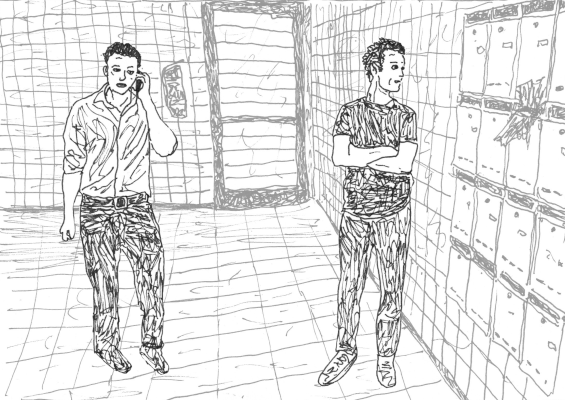 |
(Italiano) Tornati in Germania, i Ragazzi hanno una brutta sorpresa e devono cambiare i loro piani. Heinz prende la situazione con filosofia, mentre Helmut può essere calmato solo da un gelato, a cui arriva con precisione millimetrica. |
(Deutsch) Zurück in Deutschland erleben die Jungs eine böse Überraschung und müssen ihre Pläne ändern. Heinz nimmt die Sache einigermaßen gelassen hin, während sich Helmut nur durch ein Eis beruhigen lässt, zu dem er zielgenau findet. Special Version | ||
zu Hause Tag 20 Helmut: Seltsam. Ich versuch's mal bei Max. |
Home Day 20 Helmut: That's strange. I'll try to get Max on the phone. |
à la maison Jour 20 Helmut : C'est étrange. Je vais essayer d'avoir Max au téléphone. |
a casa Giorno 20 Helmut: È strano. Provo a chiamare Max. |
en casa Día 20 Helmut: Qué extraño. Intentaré hablar con Max por teléfono. |
(English) Heinz is so busy with the preparations that Helmut has to remind him that the Lodge is celebrating a special party that day. He even remembered to bring the 3D glasses. However, he did not expect to lose out in the fight between the pharaoh and the Vulcan. |
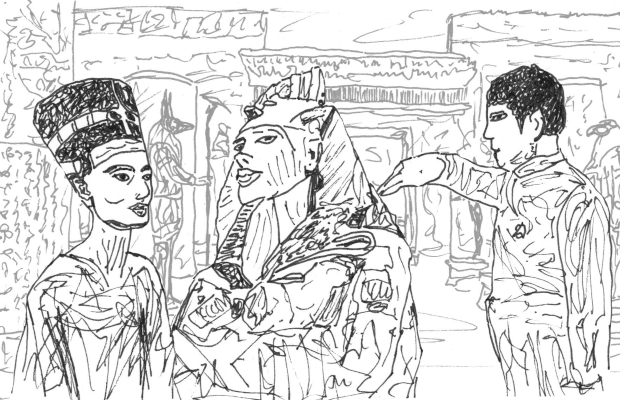 |
(Italiano) Heinz è così impegnato nei preparativi che Helmut deve ricordargli che quel giorno la Loggia terrà una festa speciale. Ha persino pensato agli occhiali 3D. Tuttavia, non si aspettava di perdere nella battaglia tra Faraone e Vulcaniano. |
(Deutsch) Heinz ist so sehr mit den Vorbereitungen beschäftigt, dass Helmut ihn daran erinnern muss, dass die Loge an diesem Tag eine besondere Party feiert. Er hat sogar an die 3D-Brillen gedacht. Dass er allerdings im Kampf Pharao gegen Vulkanier den Kürzeren zieht, hätte er nicht erwartet. Special Version | ||
Tag 23 Heinz: Hm, also Journalist oder Biologe, und für Helmut ... |
Day 23 Heinz: Hm, so, a journalist or a biologist, and for Helmut... |
Jour 23 Heinz : Hm, donc journaliste ou biologiste, et pour Helmut... |
Giorno 23 Heinz: Hm, quindi giornalista o biologo, e per Helmut... |
Día 23 Heinz: Hm, entonces periodista o biólogo, y para Helmut... |
(English) Fiona and Fanni have a lot to talk about on this stressful day at the office. Both have recently been through things difficult to explain, but it is clearly Fiona who has the most incredible stories to tell. |
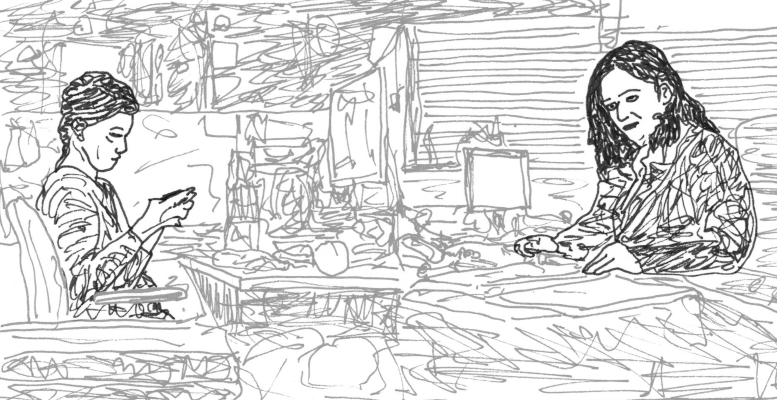 |
(Italiano) Fiona e Fanni hanno molto da raccontarsi in questa stressante giornata in ufficio. Entrambe hanno vissuto di recente esperienze difficili da spiegare, ma è chiaramente Fiona ad avere le storie più incredibili da raccontare. |
(Deutsch) Fiona und Fanni haben einander viel zu erzählen an diesem stressigen Tag im Büro. Beide haben in letzter Zeit Dinge erlebt, die sich schwer erklären lassen, aber es ist eindeutig Fiona, die die unglaublicheren Geschichten zu bieten hat. Special Version | ||
Tag 24 Fanni: Wo ist denn jetzt dieser blöde Ordner? Der war doch gerade noch da. Ich brauch Urlaub, ich sag's dir. |
Day 24 Fanni: Now where is that stupid folder? It was right here a moment ago. I need a vacation, I'm telling you. |
Jour 24 Fanni : Où est donc passé ce stupide classeur-là ? Il était juste là il y a un instant. J'ai besoin de vacances, je te le dis. |
Giorno 24 Fanni: Dov'è quella stupida cartella? Era proprio qui un attimo fa. Ho bisogno di una vacanza, te lo dico io. |
Día 24 Fanni: ¿Dónde está esa carpeta estúpida? Estaba aquí hace un momento. Necesito unas vacaciones, te lo digo en serio. |
(English) When the two arrive in Costa Rica, Heinz has to make a confession to Helmut, and he brings up the difficulties they are facing. Helmut remains surprisingly calm and first takes a curious look around. |
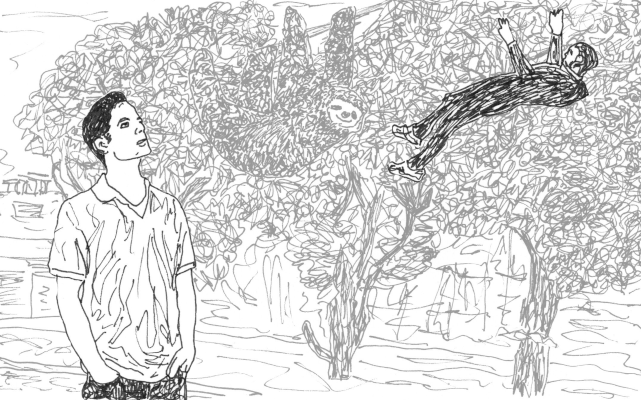 |
(Italiano) Quando i due arrivano in Costa Rica, Heinz deve fare una confessione a Helmut e accenna alle difficoltà che stanno affrontando. Helmut rimane sorprendentemente calmo e si guarda intorno con curiosità. |
(Deutsch) Als die beiden in Costa Rica ankommen, muss Heinz Helmut ein Geständnis machen, und er spricht die Schwierigkeiten an, mit denen sie konfrontiert sind. Helmut bleibt erstaunlich gelassen und schaut sich erst einmal neugierig um. Special Version | ||
Tag 26 Heinz: Wieso grinst du eigentlich die ganze Zeit so? Kitzeln dich die Regenwürmer unter deinen Füßen? |
Day 26 Heinz: How come you're grinning like that all the time? Are the earthworms tickling your feet? |
Jour 26 Heinz : Pourquoi souris-tu tout le temps comme ça ? Est-ce que les vers de terre te chatouillent sous tes pieds ? |
Giorno 26 Heinz: Come mai sorridi sempre così? I lombrichi ti fanno il solletico ai piedi? |
Día 26 Heinz: ¿Por qué sonríes así todo el rato? ¿Te hacen cosquillas las lombrices bajo los pies? |
(English) In a good mood, Helmut walks to the soda bar, where Heinz is sitting outside at a table, brooding. But actually, he has nothing to worry about, because it's one of those days when everything just goes Helmut's way. |
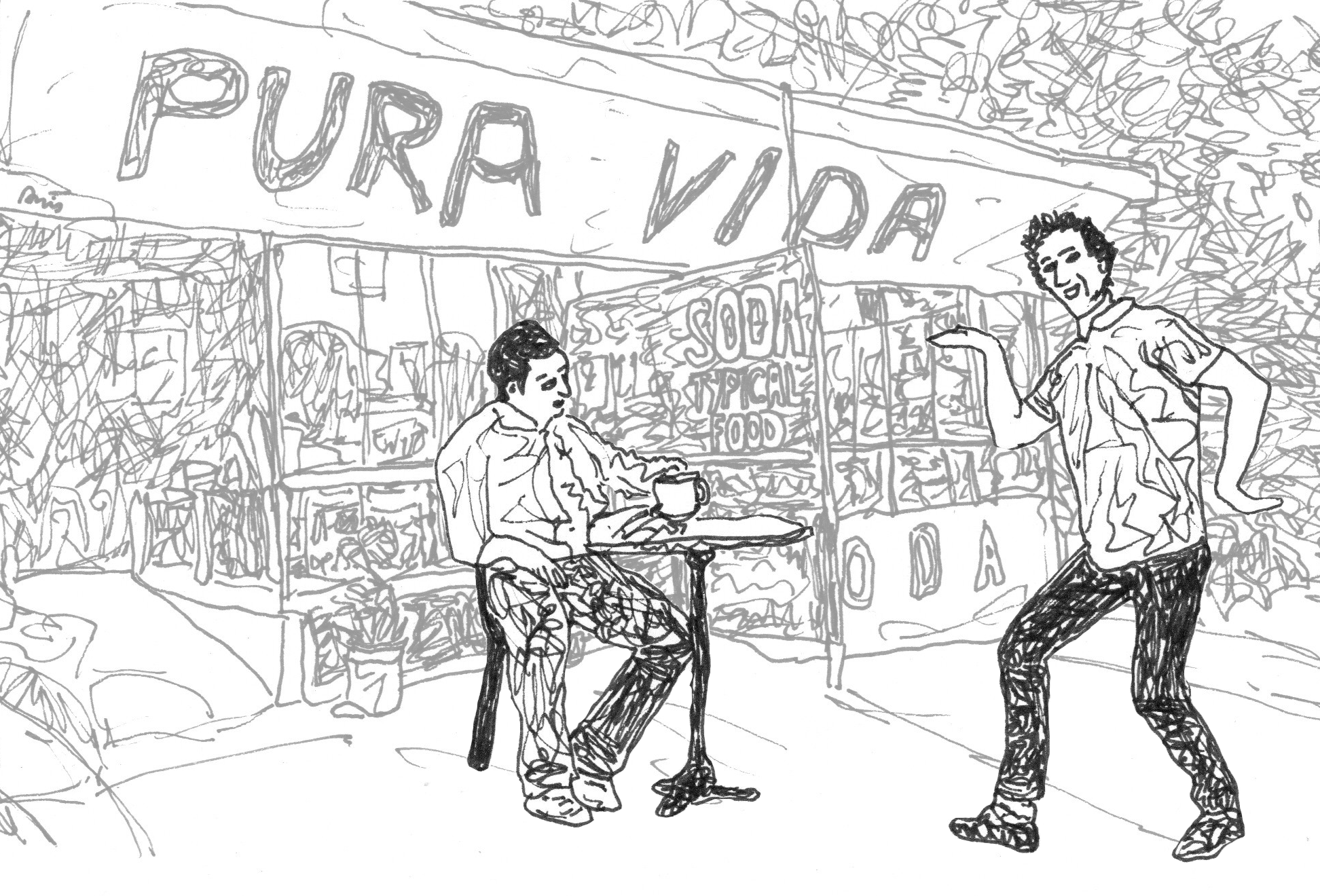 |
(Italiano) Di buon umore, Helmut si reca al bar della soda, dove Heinz è seduto fuori ad un tavolo a rimuginare. Ma in realtà non ha nulla di cui preoccuparsi, perché è uno di quei giorni in cui Helmut riesce semplicemente a raggiungere ogni obiettivo che si propone. |
(Deutsch) Gut gelaunt spaziert Helmut zur Soda-Bar, wo Heinz draußen an einem Tisch sitzt und grübelt. Dabei muss er sich gar keine Sorgen machen, denn es ist einer dieser Tage, an denen Helmut einfach alles gelingt. Special Version | ||
Tag 28 Helmut: Pura Vida! Tschaka-tschaka, aga-aga, uga. |
Day 28 Helmut: Pura Vida! Chaka-chaka, aga-aga, ooga. |
Jour 28 Helmut : Pura Vida ! Tchaca-tchaca, aga-aga, ouga. |
Giorno 28 Helmut: Pura Vida! Ciaka-ciaka, aga-aga, uga. |
Día 28 Helmut: ¡Pura Vida! Chaka-chaka, aga-aga, uga. |
(English) A day and a half later, the Boys arrive on the island. How will the national park employees react to them? Before they can even form an opinion, things start to spiral out of control, because Helmut has picked a blade of grass. Yes, a blade of grass. |
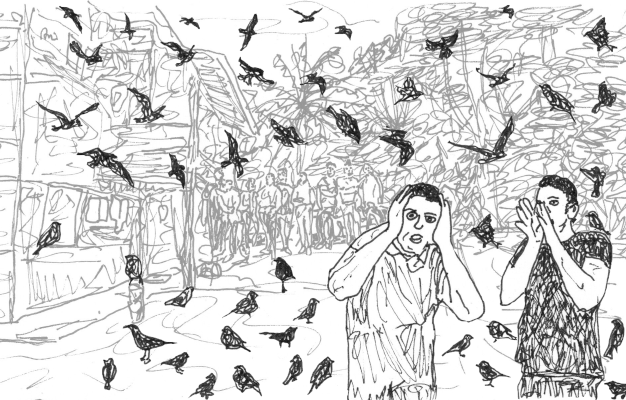 |
(Italiano) Un giorno e mezzo dopo, i Ragazzi arrivano sull'isola. Come reagiranno i dipendenti del parco nazionale? Prima ancora che possano farsi un'opinione, le cose iniziano a sfuggire di mano perché Helmut ha raccolto un filo d'erba. Sì, un filo d'erba. |
(Deutsch) Eineinhalb Tage später sind die Jungs auf der Insel angekommen. Wie werden die Mitarbeiter des Nationalparks auf sie reagieren? Bevor sie sich eine Meinung bilden können, überschlagen sich die Ereignisse, denn Helmut hat einen Grashalm gepflückt. Ja, einen Grashalm. Special Version | ||
Tag 30 Helmut: Komm, wir gehen da jetzt hin! |
Day 30 Helmut: Come on, let's go over there now! |
Jour 30 Helmut : Viens, on y va maintenant ! |
Giorno 30 Helmut: Dai, andiamo lì ora! |
Día 30 Helmut: ¡Venga, vamos allí ahora! |
(English) Using his special method, Helmut has ensured that the Boys have more freedom on the island than they could ever have dreamed of. However, on a first guided tour, Helmut makes a terrible discovery in the wake of an interaction with a local reptile. |
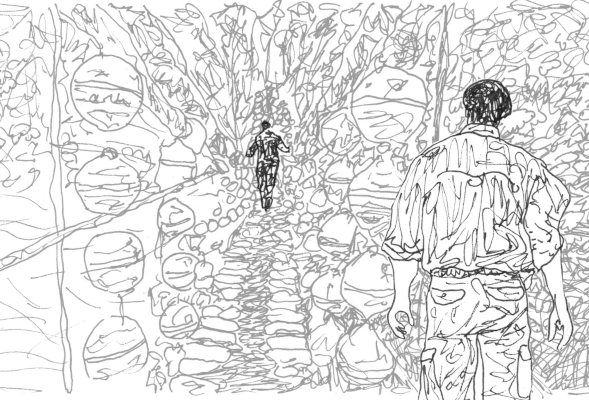 |
(Italiano) Con il suo metodo speciale, Helmut si assicura rapidamente che i Ragazzi abbiano più libertà sull'isola di quanta ne avrebbero mai potuta sognare. Durante la loro prima visita guidata, però, Helmut fa una terribile scoperta dopo aver interagito con un rettile locale. |
(Deutsch) Mit seiner speziellen Methode hat Helmut in kürzester Zeit dafür gesorgt, dass die Jungs mehr Freiheiten auf der Insel haben, als sie sich je hätten erträumen können. Auf einem ersten geführten Rundgang macht Helmut jedoch nach der Interaktion mit einem heimischen Reptil eine schreckliche Entdeckung. Special Version | ||
Tag 31 Heinz: Ich war so ein Idiot! |
Bridge Day 31 Heinz: I was such an idiot! |
des têtes de mort Jour 31 Heinz : J'ai été un tel idiot ! |
dei teschi Giorno 31 Heinz: Sono stato un idiota! |
de cráneos Día 31 Heinz: ¡He sido un idiota! |
(English) Helmut's lucky streak continues and Heinz reproaches himself for not having reacted appropriately in the past. So now he is determined to show his friend that he has learned from his mistakes and changed his behavior. |
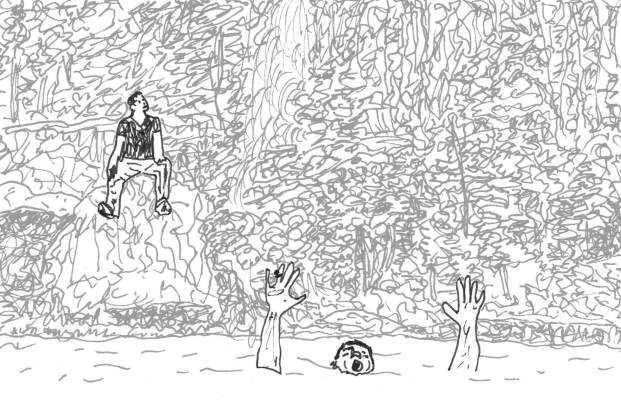 |
(Italiano) La fortuna di Helmut continua e Heinz si rimprovera di non aver reagito in modo appropriato in passato. Ora dimostra con forza all'amico di aver imparato dai suoi errori e di aver cambiato comportamento. |
(Deutsch) Helmuts Glückssträhne reißt nicht ab und Heinz macht sich Vorwürfe, weil er in der Vergangenheit nicht angemessen reagiert hat. Nachdrücklich demonstriert er seinem Freund nun, dass er aus seinen Fehlern gelernt und sein Verhalten verändert hat. Special Version | ||
Tag 33 Heinz: Ah, da bist du ja schon wieder. Und? |
Day 33 Heinz: Ah, there you are again. Well? |
Jour 33 Heinz : Ah, te revoilà. Et alors ? |
Giorno 33 Heinz: Ah, sei tornato. Allora? |
Día 33 Heinz: Ah, has vuelto. ¿Y bien? |
(English) The technicians will be leaving the island shortly and the Boys have to decide whether they want to go with them. A call pulls the two away from their thoughts and makes them forget everything they were talking about before. |
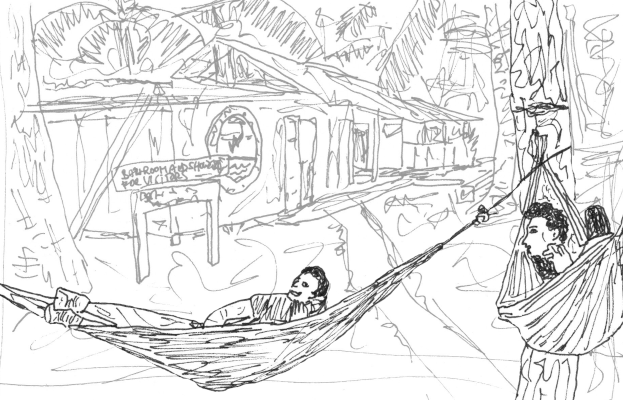 |
(Italiano) I tecnici presto lasceranno di nuovo l'isola e i Ragazzi devono decidere se vogliono andare con loro. Una chiamata li distoglie dai loro pensieri e fa loro dimenticare tutto ciò di cui hanno appena parlato. |
(Deutsch) In Kürze werden die Techniker die Insel wieder verlassen und die Jungs müssen sich entscheiden, ob sie mitfahren wollen. Eine Anruf holt die beiden aus ihren Gedanken und lässt sie alles vergessen, worüber sie gerade noch gesprochen haben. Special Version | ||
Ferngespräch Tag 35 Heinz: Zum Wohl! |
Day 35 Heinz: Cheers! |
Jour 35 Heinz : A la tienne ! |
Giorno 35 Heinz: Salute! |
Día 35 Heinz: ¡Salud! |
(English) Helmut continues the long-distance call in a quiet place and learns, among other things, something very current about the fraudulent partner. The Boys lose no time and immediately pick up the trail. |
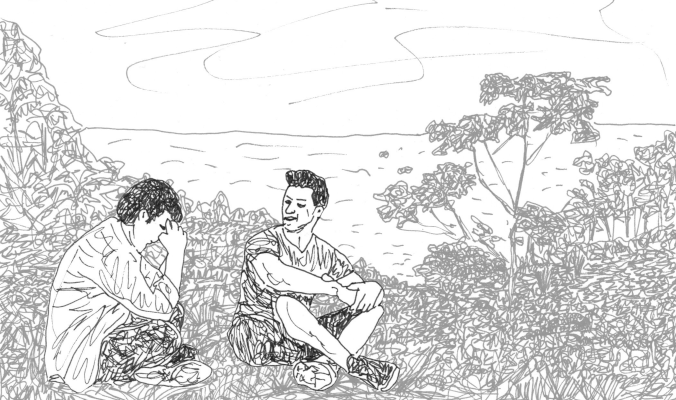 |
(Italiano) In un luogo tranquillo, Helmut continua la telefonata a distanza e scopre qualcosa di molto attuale sul partner che tradisce, tra le altre cose. I Ragazzi non perdono tempo e captano subito l'odore. |
(Deutsch) An einem ruhigen Ort führt Helmut das Ferngespräch fort und erfährt unter anderem etwas sehr Aktuelles über den betrügerischen Kompagnon. Die Jungs verlieren keine Zeit und nehmen sofort die Fährte auf. Special Version | ||
Tag 35 Heinz: Kannst du sie schon sehen? |
Day 35 Heinz: Can you see her yet? |
Jour 35 Heinz : Tu la vois déjà ? |
Giorno 35 Heinz: Riesci già a vederla? |
Día 35 Heinz: ¿Ya puedes verla? |
(English) The Boys manage to fake their departure, so that they can move around the island undisturbed. Will they eventually find their treasure? The preparations, at least, are complete, and they also have a dry headquarters. |
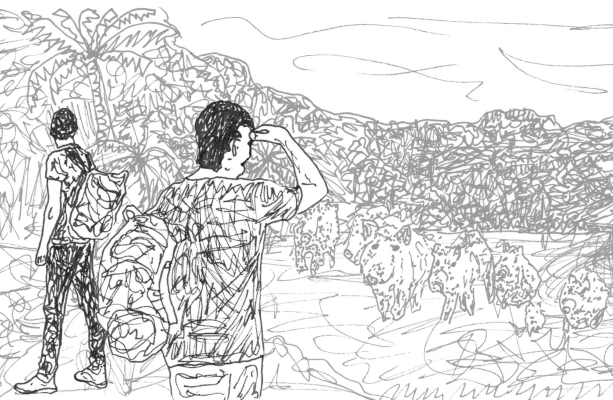 |
(Italiano) Con un trucco, i Ragazzi riescono a fingere la loro partenza e possono così spostarsi indisturbati sull'isola. Troveranno il loro tesoro alla fine? In ogni caso, tutti i preparativi sono stati fatti e hanno anche un quartier generale asciutto. |
(Deutsch) Mit einem Trick gelingt es den Jungs, ihre Abfahrt vorzutäuschen, sodass sie sich ungestört auf der Insel bewegen können. Werden sie am Ende ihren Schatz finden? Alle Vorbereitungen sind jedenfalls getroffen und ein trockenes Hauptquartier haben sie auch. Special Version | ||
Tag 37 Heinz: Doch Leute, ich bestehe darauf! |
Day 37 Heinz: No, guys, I insist! |
Jour 37 Heinz : Si, les gars, j'insiste ! |
Giorno 37 Heinz: Sì, ragazzi, insisto! |
Día 37 Heinz: ¡Sí, chicos, insisto! |
(English) Dangers lurk in the jungle that should not be underestimated. On the other hand, you can't think of everything and you can't plan for everything either. In this episode, the Boys learn this lesson in a rather drastic way. |
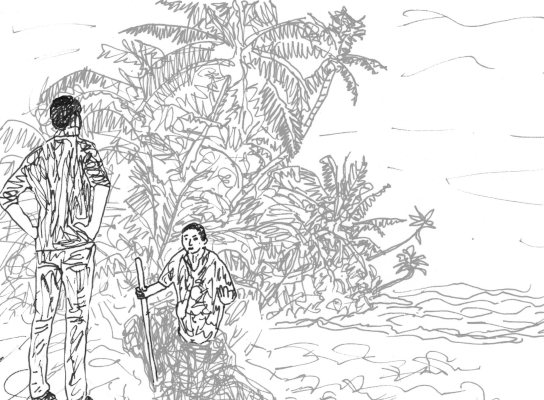 |
(Italiano) Ci sono pericoli in agguato nella giungla che non vanno sottovalutati. D'altra parte, non si può pensare a tutto e nemmeno pianificare tutto. I Ragazzi imparano questo principio in modo molto drastico in questo episodio. |
(Deutsch) Im Dschungel lauern Gefahren, die man nicht unterschätzen sollte. Andererseits kann man nicht an alles denken und auch nicht alles planen. Das erfahren die Jungs in dieser Episode auf recht drastische Weise. Special Version | ||
Tag 38 Heinz: Hab ich einen Hunger! |
Day 38 Heinz: I'm so hungry! |
Jour 38 Heinz : J'ai tellement faim ! |
Giorno 38 Heinz: Ho tanta fame! |
Día 38 Heinz: ¡Tengo mucha hambre! |
(English) When Heinz comes to in the cave, a lot has changed. Helmut has not only taken care of the daily chores, but has also armed himself. Fortunately, the Boys get unexpected support, not only for the impending battle, but also for the treasure hunt. |
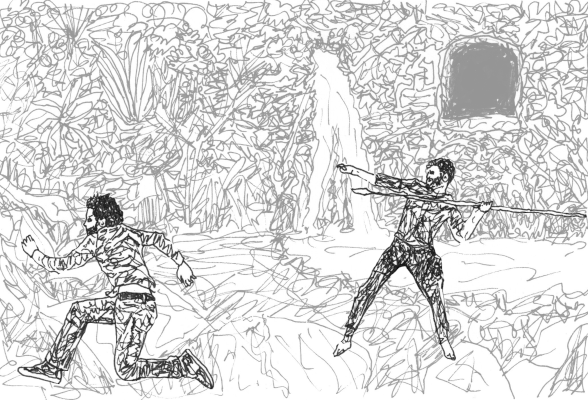 |
(Italiano) Quando Heinz riprende conoscenza nella grotta, molte cose sono cambiate. Helmut non solo si è occupato delle faccende quotidiane, ma si è anche armato. Fortunatamente, i Ragazzi ricevono un sostegno inaspettato, per l'imminente battaglia e anche per la caccia al tesoro. |
(Deutsch) Als Heinz in der Höhle wieder zu sich kommt, hat sich einiges verändert. Helmut hat sich nicht nur um die täglichen Hausarbeiten gekümmert, sondern sich auch bewaffnet. Zum Glück bekommen die Jungs unerwartete Unterstützung, was den bevorstehenden Kampf betrifft, aber auch die Schatzsuche. Special Version | ||
Tag 45 Heinz: Oooh. |
Day 45 Heinz: Oooh. |
Jour 45 Heinz : Oooh. |
Giorno 45 Heinz: Oooh. |
Día 45 Heinz: Oooh. |
(English) The danger is averted and Heinz receives an important clue to the treasure's location. But then Helmut interrupts and Heinz briefly loses his courage. |
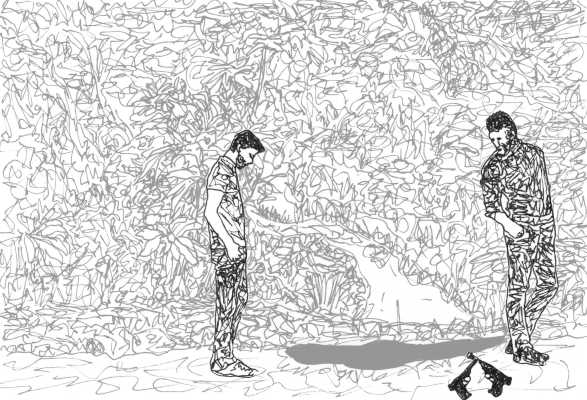 |
(Italiano) Il pericolo viene scongiurato e Heinz ottiene un importante indizio sull'ubicazione del tesoro. Ma poi interviene Helmut e Heinz perde brevemente il coraggio. |
(Deutsch) Die Gefahr ist gebannt und Heinz bekommt einen wichtigen Hinweis auf die Position des Schatzes. Aber dann funkt Helmut dazwischen und Heinz verlässt kurzzeitig der Mut. Special Version | ||
Tag 45 Heinz: Eine Grube! Gute Arbeit, alter Junge! Von mir! Gute Arbeit von mir! |
Day 45 Heinz: A pit! Good work, old boy! By me! Good work by me! |
Jour 45 Heinz : Une fosse ! Bon travail, mon vieux ! De ma part ! Bon travail de ma part ! |
Giorno 45 Heinz: Una fossa! Ottimo lavoro, vecchio mio! Mio! Il mio ottimo lavoro! |
Día 45 Heinz: ¡Un pozo! ¡Buen trabajo, viejo amigo! ¡Por mí! ¡Buen trabajo por mí! |
(English) The Boys diligently continue to dig, in search of their treasure. To pass the time, Helmut tells his friend about some events that happened during his absence. Heinz counters with a movie quiz. |
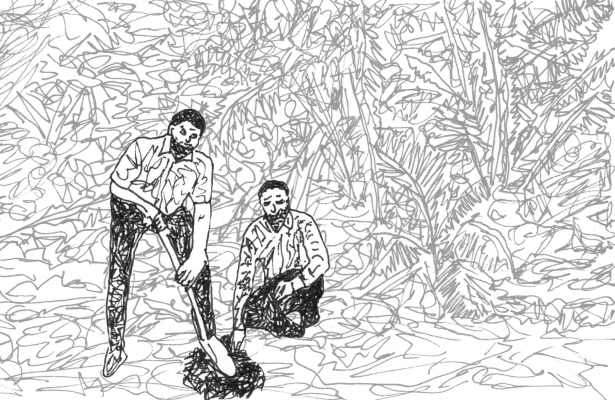 |
(Italiano) I Ragazzi continuano a scavare diligentemente alla ricerca del loro tesoro. Per passare il tempo, Helmut racconta all'amico alcune cose successe durante la sua assenza. Heinz risponde con un quiz cinematografico. |
(Deutsch) Fleißig graben die Jungs weiter, auf der Suche nach ihrem Schatz. Um sich die Zeit zu vertreiben, erzählt Helmut seinem Freund von einigen Ereignissen in der Zeit seiner Abwesenheit. Heinz kontert mit einem Filmquiz. Special Version | ||
Tag 45 Heinz: Hier in der Nähe des Ameisenbaums, hat Castanheira gesagt. Und diesen Felsen hat er wiedererkannt. |
Day 45 Heinz: It's near the cecropia tree, Castanheira said. And he recognized this rock. |
Jour 45 Heinz : C'est près de l'arbre cecropia, dit Castanheira. Et il a reconnu ce rocher. |
Giorno 45 Heinz: È vicino all'albero di cecropia, ha detto Castanheira. E ha riconosciuto questa roccia. |
Día 45 Heinz: Está cerca del árbol de cecropia, dijo Castanheira. Y reconoció esta roca. |
(English) Heinz finds a high-performance torch, which the two of them can use to continue their search in the dark. The bright light has its advantages and disadvantages. And the treasure? Well, the treasure too. |
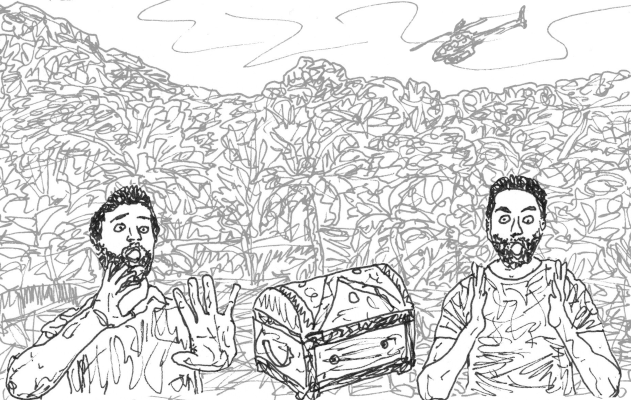 |
(Italiano) Heinz trova una torcia ad alte prestazioni, con la quale i due possono continuare la ricerca al buio. La luce intensa ha vantaggi e svantaggi. E il tesoro? Beh, anche quello. |
(Deutsch) Heinz findet eine Hochleistungstaschenlampe, mit der die beiden auch in der Dunkelheit weitersuchen können. Das grelle Licht hat Vor- und Nachteile. Und der Schatz? Nun, der auch. Special Version | ||
Tag 45 Heinz: Was für ein Tag! RaaRaaRaa ba-pamm |
Day 45 Heinz: What a day! RaaRaaRaa ba-pamm |
Jour 45 Heinz : Quelle journée ! RaaRaaRaa ba-pamm |
Giorno 45 Heinz: Che giornata! RaaRaaRaa ba-pamm |
Día 45 Heinz: ¡Vaya día! RaaRaaRaa ba-pamm |
(English) While Fiona is driving her home after work, Fanni tells her about the latest developments with her boyfriend. When Fiona then starts talking about Heinz, who has come home again, they notice an interesting similarity. |
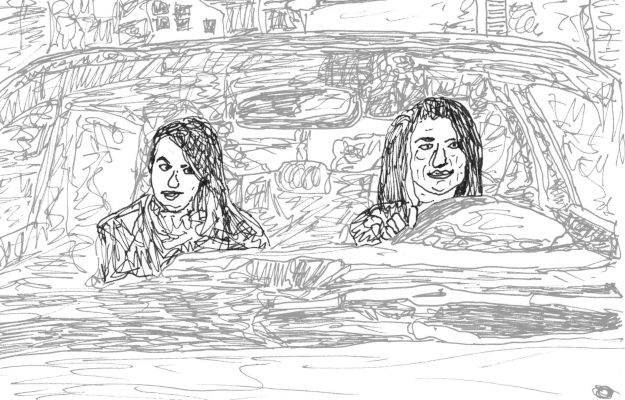 |
(Italiano) Mentre Fiona la riaccompagna a casa dopo il lavoro, Fanni le racconta degli ultimi sviluppi con il suo ragazzo. Poi, quando Fiona le parla di Heinz, che è tornato a casa, le due si rendono conto di avere qualcosa di interessante in comune. |
(Deutsch) Während Fiona sie nach der Arbeit nach Hause fährt, erzählt Fanni ihr von den neuesten Entwicklungen mit ihrem Freund. Als Fiona danach von Heinz berichtet, der wieder nach Hause gekommen ist, stellen sie eine interessante Gemeinsamkeit fest. Special Version | ||
Tag 50 Fanni: Ich hätte mir auch ein Taxi nehmen können, kein Problem. |
Day 50 Fanni: I could have taken a taxi, no problem. |
Jour 50 Fanni : J'aurais pu prendre un taxi, pas de problème. |
Giorno 50 Fanni: Avrei potuto prendere un taxi, senza problemi. |
Día 50 Fanni: Podría haber cogido un taxi, sin problemas. |
| Weiter geht's mit Staffel 6: Die Jungs räumen ab / The story continues with The Boys Take it All |
| up |  |
| Datenschutzerklärung und Impressum (data privacy statement and imprint) |